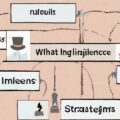What is Emotional Intelligence (EQ)?
Emotional intelligence, often referred to as EQ, is the ability to recognize, understand, and manage our own emotions, as well as the emotions of others. It’s a powerful skill that can greatly enhance our personal and professional relationships, improve our decision-making abilities, and contribute to overall wellbeing and success in life.
At its core, emotional intelligence is about developing a deep sense of self-awareness and empathy. It allows us to navigate complex social situations with grace, respond to challenges with resilience, and foster meaningful connections with those around us.
Key Components of Emotional Intelligence
Emotional intelligence comprises several interconnected skills:
- Self-awareness: The ability to recognize and understand your own emotions, strengths, weaknesses, values, and motivations.
- Self-regulation: The capacity to manage your emotions and impulses, adapting to changing circumstances with flexibility.
- Motivation: The drive to pursue goals with energy and persistence, often for reasons that go beyond money or status.
- Empathy: The skill of understanding the emotions of others and considering their perspectives.
- Social skills: The ability to manage relationships, inspire others, and navigate social networks effectively.
By developing these components, we can cultivate a more compassionate and understanding approach to both ourselves and others.
The Benefits of High Emotional Intelligence
Enhancing our emotional intelligence can lead to numerous positive outcomes in various aspects of our lives:
- Improved communication and relationships
- Better stress management and emotional regulation
- Increased empathy and understanding of others
- Enhanced leadership skills
- Greater resilience in face of challenges
- Improved decision-making abilities
- Higher overall life satisfaction and wellbeing
By focusing on developing our EQ, we can create a more harmonious and fulfilling life, both personally and professionally.
Practical Ways to Improve Emotional Intelligence
Improving emotional intelligence is a lifelong journey, but there are several practical steps we can take to enhance our EQ:
- Practice mindfulness: Regular meditation or mindfulness exercises can help increase self-awareness and emotional regulation.
- Keep an emotion journal: Reflect on your emotions daily, noting what triggers them and how you respond.
- Seek feedback: Ask trusted friends or colleagues for honest feedback about your emotional responses and interactions.
- Practice active listening: Focus on truly understanding others rather than just waiting for your turn to speak.
- Develop empathy: Try to put yourself in others’ shoes and imagine how they might be feeling.
- Manage stress: Develop healthy coping mechanisms for stress, such as exercise, deep breathing, or hobbies.
- Reflect on your values: Regularly consider what’s truly important to you and align your actions accordingly.
Remember, improving emotional intelligence is a gradual process. Be patient and compassionate with yourself as you work on developing these skills.
Emotional Intelligence in the Workplace
In professional settings, emotional intelligence can be a significant asset. Employees and leaders with high EQ often excel in:
- Conflict resolution
- Team collaboration
- Customer service
- Leadership and management
- Adapting to change
- Navigating office politics
Many organizations now recognize the value of emotional intelligence and offer training programs to help employees develop these crucial skills. By fostering a culture of emotional intelligence, companies can create more positive, productive, and harmonious work environments.
Coaching and Training for Emotional Intelligence
For those looking to significantly enhance their emotional intelligence, working with a coach or participating in specialized training can be incredibly beneficial. EQ coaches can provide personalized guidance, feedback, and strategies tailored to your specific needs and goals.
Some effective coaching and training approaches include:
- One-on-one coaching sessions
- Group workshops and seminars
- Role-playing exercises
- Self-assessment tools and personality tests
- Emotional intelligence certification programs
When seeking out coaching or training, look for programs that offer a balance of theoretical knowledge and practical application. The most effective learning experiences will provide opportunities to practice and refine your EQ skills in real-world scenarios.
Frequently Asked Questions About Emotional Intelligence
1. Can emotional intelligence be learned?
Yes, emotional intelligence can be developed and improved throughout life. While some people may naturally have higher EQ, everyone can enhance their emotional intelligence skills through practice, self-reflection, and learning.
2. How is EQ different from IQ?
While IQ (Intelligence Quotient) measures cognitive abilities like logical reasoning and problem-solving, EQ (Emotional Quotient) focuses on emotional awareness, empathy, and interpersonal skills. Both are important, but EQ is often considered more crucial for success in relationships and leadership roles.
3. How can I measure my emotional intelligence?
There are various assessments available to measure emotional intelligence, including self-report questionnaires and 360-degree feedback tools. However, the most valuable insights often come from self-reflection and feedback from others who know you well.
4. Is it possible to have too much emotional intelligence?
While it’s rare, extremely high levels of certain aspects of EQ (like empathy) can potentially lead to emotional exhaustion or difficulty in making objective decisions. The key is to develop a balanced emotional intelligence that allows you to be aware and empathetic without becoming overwhelmed.
5. How long does it take to improve emotional intelligence?
Improving emotional intelligence is an ongoing process. While you may notice some changes relatively quickly (within weeks or months), significant and lasting improvements typically require consistent effort over a longer period. The journey of enhancing EQ is lifelong, with continuous opportunities for growth and refinement.
In conclusion, emotional intelligence is a powerful set of skills that can greatly enhance our personal and professional lives. By developing our EQ, we can foster more meaningful relationships, navigate challenges with resilience, and contribute to a more compassionate and understanding world. Remember, the journey to improved emotional intelligence is ongoing, so be patient and kind to yourself as you grow and learn.









